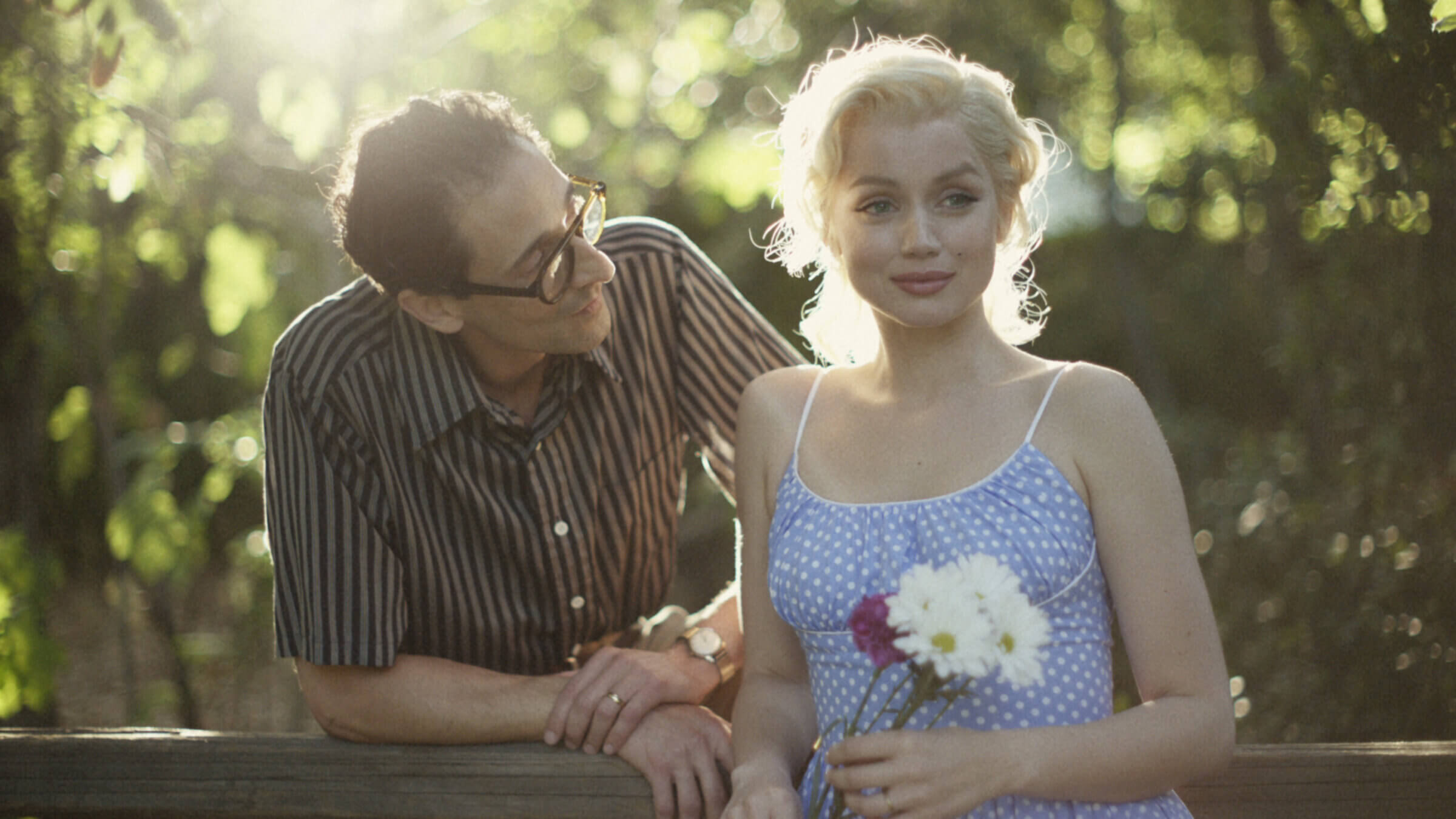In ‘Blonde,’ Arthur Miller is Marilyn Monroe’s Jewish husband, and we all know what that means (don’t we?)
Andrew Domink’s adaptation of Joyce Carol Oates’ novel casts Adrien Brody as a foil to DiMaggio

Adrien Brody as Arthur Miller and Ana de Armas as Marilyn Monroe. Courtesy of Netflix
A few months ago, Joyce Carol Oates, as is her wont, tweeted something baffling:
“When I was first married to my (Jewish) husband two Jewish women friends of mine took me aside and said with wry smiles: ‘Welcome to the club.’ Soon, I knew what they meant.”
when I was first married to my (Jewish) husband two Jewish women friends of mine took me aside & said with wry smiles: "Welcome to the club." soon, I knew what they meant.
No one was entirely sure what Oates meant. Her attempt to clarify (a captionless photo of her late husband on a bridge near a backdrop of conifers and mountains) did little to help. But watching “Blonde,” the fitful, NC-17 fever dream of Oates’ best-known novel, about Marilyn Monroe (née Norma Jeane Baker), I couldn’t stop thinking of what she — and filmmaker Andrew Dominik — meant to say with their portrayal of Arthur Miller.
While Oates’ novel lightly obscures key names with titles like “Ex-athlete” and “the Playwright,” Dominik’s film — a punishing and impressionistic Hollywood martyr story — is more direct. Though never named as such, Bobby Cannavale plays “Joltin’ Joe” DiMaggio and Adrien Brody is Arthur Miller. The two men serve as polarized totems of Norma Jeane’s love life.
Marilyn (Ana De Armas) divorces DiMaggio, who is possessive and physically abusive. Miller, introduced spilling a stackful of pages near the Astor Place subway entrance, makes for a too-perfect romantic foil.
The brutish, ethnic athlete is replaced by a rangy, bespectacled, ethnic writer type, who wistfully handles a snapshot of a former love. “Magda, Magda,” he repeats. We soon learn that Magda is not just Miller’s “own first love,” an immigrant who spoke broken English, but a role in his new play. Imagine Miller’s surprise when he arrives at a reading to see Marilyn Monroe in the part.
“Magda — her?” Miller says, in his familiar “Boy Grew in Brooklyn” accent. But by the end of the play, he’s in tears.
After the reading, Miller and Marilyn sit down for coffee and discuss the role. Miller is shocked by her insights — the connections she makes to Chekhov’s “Three Sisters.” He is absolutely bowled over that she realizes that Magda, who is probably illiterate, is just pretending to read the writing of the character Isaac. (By way of fictional elements, I don’t think this is a real play, though it, like Miller’s once-mentioned, invented ex, “Esther,” seems pointedly Semitic.)
This note is a breakthrough that sends Miller reeling and, eventually, makes Marilyn a vessel for his lost love.
At this point in the film we are entering some potentially hazardous territory, with an avatar of tender-hearted, New York Jewish erudition (the sort that won’t raise a hand to you), wooing the picture of peroxided goyishe beauty. Monroe’s own conversion to Judaism is duly glossed over. In a montage of their prenuptial press tour, a reporter asks what kind of wedding they’ll have. “Very quiet I hope,” Marilyn replies.
Life with Miller is quiet, shifting to a sort of perfume commercial presentation, as she calls to him, “Daddy, I don’t ever want to leave.”
Of course, trouble comes to paradise. While Miller is largely solicitous, he has a mild Hitchcockian urge to mold an icy blonde to his liking and use her in his art. She is not Magda or Marilyn but Norma in their home, and yet, like every man in her life, he betrays her. One day, Marilyn goes up to his home office, lovingly surveying pages laid out on a desk, only to find lines of dialogue ripped from a discussion they had. The discussion concerns a pledge he made to never write about their relationship. Oops.
It’s a relief that Miller’s behavior doesn’t fall into something Svengali-esque or predatory. His trespasses are the most venial of all of Norma’s beaus, their breakup largely framed as the result of a miscarriage. (There is a scene where the fetus speaks to her; out of context, a number of sequences here could play well as pro-life propaganda.)
In the final reckoning, Miller is the partner who best understands her. He alone appreciates her intellect. He embodies common stereotypes of a Jewish husband: educated, attentive, and a good provider, if a meek one not equipped for crisis. He’s the sort of person who won’t tread on your toes or take control when you’re clearly spiraling into drug use. Who seems only the tiniest bit concerned when you trash your bedroom. “What can I do to help you, darling?” he’ll ask, but he won’t really help.
Dominik’s film, in all its bewildering toggles in aspect ratio and black and white to color also ends with a final double exposure: the fractured identity of Norma the victim and Marilyn the pinup. While skipping the steps leading up to a pivotal transformation, “Blonde” wants to tell us about the roles we play and the constructs we fit into.
In the end, the role Miller plays, as yet another surrogate for Norma’s missing father, is fungible. After crashing her car into a tree, Norma staggers into their home and, seeing Miller there, asks “Who are you?” Miller’s face blurs in and out as he says, “Norma, I’m your husband.”
Norma doesn’t register what that means in the moment. But the larger point, in all its glaring banality, is we can never really know a person if we insist on simple classifications like “Jewish husband,” “ex-athlete” or “blonde.” Oates should know that too — she wrote the book on it.






















